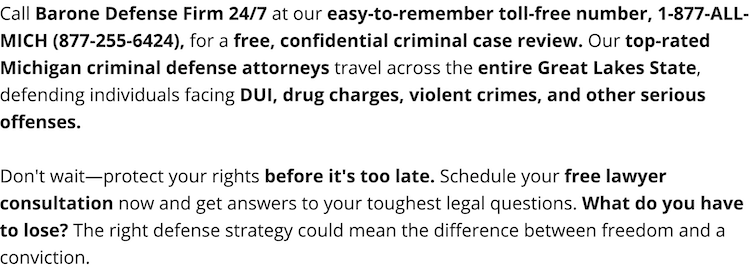How to Prepare for Your Sentencing Hearing in Michigan
If you have plead guilty to have been found guilty of a crime in Michigan, then your case will be set for a sentencing hearing. The sentencing hearing is a very important one, and it will benefit you to be well prepared in advance. The following information will help you understand what will happen at the hearing and give you some ideas as to how you can work with your lawyer to obtain the best possible sentence.
In most cases you will be interviewed by a probation officer prior to sentencing. During this interview, the probation officer will collect information about your background, including a criminal history, employment information, education, family history and other relevant information. If you have been convicted of DUI, then you will also be asked to complete a NEEDS assessment. The purpose of this pen and paper (or computer) test is to help the court determine if you may have a substance use disorder requiring intervention. The probation officer will use all this information to compile a presentence investigation and report, or PSIR. According to the applicable laws, a PSIR must include the following information:
A Complete Criminal History
A description of the crime. Most probation officers will simply cut-and-paste from the police report. You will also be asked to provide your version of events.
General biographical information, including your education and employment history and any military history. Also, your family history, marital status, financial status, residence address and history, along with other relevant information.
Your relevant medical history, including a history of mental health or substance use treatment.
If you are being sentenced on a felony in the state or federal court, then a calculation of the sentencing guidelines will also be included. The PSIR will also include a recommended sentence.
Prior to the sentencing hearing you and your lawyer will have an opportunity to review the PSIR. This will allow your lawyer to prepare a list of any changes that may be necessary in case the probation officer got any of the above information wrong. Your lawyer will also be able to argue for a different guideline’s calculation.
The sentencing hearing itself will begin with your attorney indicating to the court that they have received and reviewed the report and either that it is factually accurate and that no changes are necessary or with an explanation of any changes that are needed. Next, your lawyer and the prosecutor may comment on the sentencing guidelines.
Once any guidelines calculation disputes are resolved, your lawyer will address the court on your behalf. Your lawyer will typically ask the judge to follow the sentencing recommendation contained in the PSIR, or they may articulate to the court why the recommendation is inappropriate. The prosecutor will also have a similar opportunity to address the court. If there is a victim in your case, the court will also allow them to address the court.
The last thing that will happen before you are sentenced is your statement to the court. This is called the “right of allocution” and is a requirement that must be allowed. In many cases your statement can be critically important, and you should work with your lawyer in developing this statement.
After you make your sentencing statement, the judge will pass sentence. Whatever the judge states on the record will be reduced to writing which will be signed by the judge. This document is called a “judgement of conviction,” or “judgement of conviction” and under MCR 6.427, this judgement must be prepared and signed by the judge within 7 days of your sentence.
The final thing that will happen before the sentencing hearing concludes is you will be presented with a notice of right to appeal the judge’s sentence. Your lawyer will acknowledge on the record that this document has been provided to you. This form is required to be provided to in a felony case but is not required in a misdemeanor case.
 Barone Defense Firm Home
Barone Defense Firm Home
















